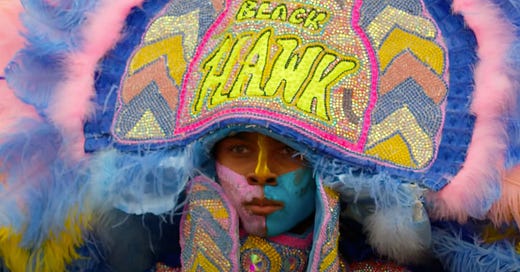American Black Film Festival 2021 with "Big Chief, Black Hawk"
The Mardi Gras Indian documentary to conquer them all.

Dear Moviegoers,
It’s not difficult at all to recognize that there are a plethora of Mardi Gran Indian documentaries out in the ether, nor is it hard to observe that each share the common denominator of upbeat joy. Hardships are discussed here and there, but for the most part, the films are exploitations of bright feathers and colorful culture - no matter who makes them. They’re not necessarily “bad” of course, just… repetitive and… creatively lost.
The subject matter matters so much to the communities who participate, that capturing what’s been captured before feels like a missed opportunity at new angles to highlight. Filmmaker Jonathan Jackson has never been one to miss such angles or speak up about them, and his feature doc Big Chief, Black Hawk is a stellar example of cinematic exploration and storytelling integrity.
The movie follows the Mardi Gras Indian tradition with open ears, wide eyes, and full hearts, letting those who live in the culture and understand it truly explain and express what they want about it. Jackson sets the parameters between talking-head interviews and providing real-world events the room and air needed to be, but the individuals and families who he showcases have the respect to speak their knowledge and experiences in their own way. It’s a challenge indeed to balance real truth with reel truth, to let moments happen, and to compose them in the same film, but Jackson achieves such grace with pride and confidence. This director acts as both confidant and composer, with great weight held high.
Big Chief, Black Hawk tells the story of black New Orleans through the maturity of Terrence Williams Jr. and the perspectives of those around him. Terrence is a young Big Chief of the tribe Black Hawk Hunters, and carries his role as leader, both in and out of Mardi Gras, with grand humility and understanding of responsibility. As told by interviewee Dow Edwards of the Timbuktu Warriors tribe and other local organizers and researchers, oppression and storms from all fronts have put the black identity of the city in jeopardy, and have placed the very history and spirit of this beat on the shoulders of Terrence and his peers.
Generations bleed from the present to the next in this film, and it’s oh so beautiful. Drone footage of city streets is first made to look like miniatures through photographic trickery, but as the story progresses to its finish, the neighborhoods come into clarity, matching the growth being felt. We witness a Black Lives Matter protest preparing to start, slowly focusing on Terrence and his apparel - a vision that combines black resistance with Mardi Gras Indian heritage and power. The camera moves slowly and patiently around, framing each second with strong meaning and big thoughts, until it lands once again on Terrence, as he begins the march. For a while, the film followed him as a kid, shooting either from slightly above or at eye level. Here, it’s carefully watching his back and, before long, looking up at him and his forward stepping. It’s powerful.
More than the other films on this subject, Big Chief, Black Hawk isn’t built on hope so much as it’s concluded on measured optimism. There’s no second line music scoring the scenes or people gushing and blushing over a culture they visit once a year, but rather there’s definition to what it’s all about, what’s at stake, and who will fight against the tide of ignorant development and construction built over destruction.
Jonathan Jackson’s remarkable production doesn’t go above and beyond, nor does it have to. It’s all so natural, as his vision is trusted by the voices documented. It’s their story AND HIS film, not BUT HIS film. Is the camera an eye in the head of the poet? In Big Chief, Black Hawk, Jackson’s eye reads the words of the poets covered, and heightens the lines that tell the tale on scale. Big scale. And what could be bigger than the battle over one’s story, of one’s history, of one’s freedom?
In a film that breaks down conflict against culture and shows what community sews up in conversation, the biggest chance that’s taken by Big Chief, Black Hawk is in betting on itself. It never fails by giving way to pop genre tactics, treating those who’ll watch not as commodities but as potential allies. You don’t make friends with faux platitudes, just satisfied customers. Repeat that strategy, and you’ll have too many of what was a good thing. Big Chief, Black Hawk returns to what’s good in documentary filmmaking, and going back would be a terrible disservice. 5/5




